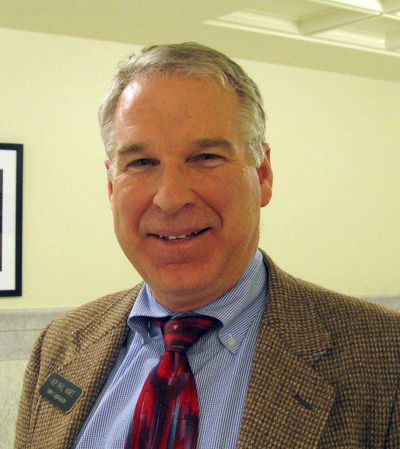Hart cast votes on new state tax rules
Lawmaker says he saw no conflict with his own case

BOISE – Idaho Rep. Phil Hart, who has big tax disputes pending over unpaid state and federal income taxes, sat on a three-member legislative subcommittee this year that reviewed new state tax rules for all Idaho taxpayers, and he cast the deciding vote on two of them.
Those included a new rule for how the state Tax Commission should handle settlements of more than $50,000 in income tax liability – at a time when Hart, R-Athol, was facing an order to pay $53,000 in back taxes on his state income, including penalties and interest. Hart never mentioned his case or declared a conflict of interest.
A special House Ethics Committee is looking into whether Hart had conflicts of interest in the Legislature due to his tax problems, and whether he abused the legislative privilege from arrest or civil process during sessions by invoking it repeatedly to win delays in his state and federal tax cases.
Rep. Grant Burgoyne, D-Boise, who served with Hart on the subcommittee, tried to get two new income tax rules killed because he thought they were too lenient on tax scofflaws. “I would’ve loved to have Phil’s support because we could’ve defeated the rule,” Burgoyne said. “I had several concerns about it. … I generally take the view that people who get away with not paying their taxes make chumps out of the rest of us.”
Hart said Monday that he saw no conflict because his own case had already progressed past the point of a possible settlement. “I was beyond the point where that would be a possibility, because I was already heading for the appeal with the Board of Tax Appeals,” he said, though that appeal had not yet been filed.
Hart said he couldn’t think of any decision on a state tax rule that would pose a conflict for him. “I mean, we are citizen legislators, and a lot of what we do during the session affects us as it affects any Idahoan,” he said. “I think if (a conflict meant) something affected us in the slightest way, we might have half the Legislature needing to bow out of a particular vote.”
The two rules that passed on 2-1 votes in the subcommittee, over Burgoyne’s objections, were designed to toughen up standards for secret settlements between state tax commissioners and protesting taxpayers, but critics said they actually weakened the rules. For example, the new rules specifically gave commissioners broad discretion to waive taxes for “economic hardship of the taxpayer,” rather than the “extreme economic hardship” cited in previous rules.
“I didn’t think the standards were tight enough,” Burgoyne said. “Inability to pay, for example, over what period of time? If you can’t pay this year, it doesn’t mean if you get back on your feet, you couldn’t pay in three, four or five years. So there weren’t a lot of standards or criteria in there.”
Rep. Gary Collins, R-Nampa, who chaired the subcommittee, said no member ever declared a conflict of interest on any of the rules the panel reviewed, which included rules dealing with state income, property and sales taxes. In addition to Hart’s income tax woes – public records show he owes nearly $700,000 in back federal and state income taxes, penalties and interest – he’s paid the property taxes on his Athol home late every year since 2002 and had to pay thousands in interest and penalties as a result.
“There was nothing mentioned about that, I do remember that,” Collins said. “He was there for all the meetings, and he listened to the same presentations that we did. … We covered quite a number of different rules.”
Collins said Hart was a fully participating member of the subcommittee, and made lots of motions. “Rep. Hart has always been not bashful about interjecting, if he has a problem with something or was in favor of something,” Collins said.
Hart made a motion during the subcommittee’s Jan. 20 meeting to reject another income tax rule, which prevented taxpayers from getting refunds by applying new operating losses back into past years despite a statute of limitations. He was outvoted 2-1.
Hart said Monday that he couldn’t recall why he objected to the rule, and didn’t think he’d faced that situation in his own business. “I remember it took quite a bit of explanation,” he said.
Steve Shaw, political scientist at Northwest Nazarene University in Nampa, Idaho, said, “It’s clearly a conflict of interest, and it’s kind of embarrassing to the Legislature and to his party, I think, that it’s gone this far.”
Hart’s state tax case came to light only after he filed his appeal this spring, which made the case public record.
The House Ethics Committee could take actions ranging from doing nothing to ejecting Hart from office; it also could recommend censure, reprimand, or removal from committee assignments. The full House would have to vote on any committee recommendation.
The House Ethics Committee meets Thursday to review Hart’s case.